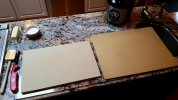- Joined
- Aug 25, 2016
- Messages
- 600
I don't know if this is the best place to post this... but what are your opinions on cutting boards? Which ones would you get and which ones would you avoid?
The BladeForums.com 2024 Traditional Knife is ready to order! See this thread for details:
https://www.bladeforums.com/threads/bladeforums-2024-traditional-knife.2003187/
Price is $300 ea (shipped within CONUS). If you live outside the US, I will contact you after your order for extra shipping charges.
Order here: https://www.bladeforums.com/help/2024-traditional/ - Order as many as you like, we have plenty.
That's easy. Avoid anything other than end grain wood or Sani-tuff rubber. Kevin, break glass board.
Are the Bamboo cutting boards any good?
End-grain cutting boards are considered to be the best, but tend to be heavy, thick, and more expensive. The Boardsmith, Brooklyn Butcher Blocks, and John Boos are a few quality brands to look at. There are others. Maple, walnut, and cherry are the most common woods used.
Hard rubber boards like Sani-Tuff, Hi-Soft, Asahi are recommended on several web sites frequented by pro cooks/chefs. I don't have any personal experience with them. They are said to be easy on your knife edges. Not dishwasher-safe.
Edge-grain (also called long grain) wood cutting boards are a little harder on the knife edge but are still better than most everything else.
Poly boards (high-density polyethylene) are those (usually) white plastic cutting boards you see everywhere. Dishwasher safe, and inexpensive. They work. Consider them disposable once the surface has a lot of knife marks in it.
I've seen discussions on both sides about Epicurean boards. No personal experience with them. Dishwasher safe. Some people only use them for specific tasks (like meat prep). Do further research if you are interested.
A cutting board serves two purposes - protecting your knife edges, and protecting your counter tops. Harder boards that hold up well are by their nature tougher on blade edges. Glass, ceramic, marble should never be used, because they will dull your blade edges very quickly.
Teak and bamboo are also rather hard, and hard on knife edges because they both have a lot of natural silicates in them which are abrasive (and therefore dulling) to knife blades. Some people like them. I don't have experience with either, just repeating what I have read on other sites.
What I personally use most often is edge-grain hinoki-wood boards (a Japanese cypress). The wood is soft and easy on knife edges, and they are very lightweight. I have several in a couple of sizes. I have other wood cutting boards, but I find the hinoki boards to be very convenient to use due to their weight. I don't know how well they will hold up over time or under heavy usage, but then I am just a casual home user and don't need something that stands up to pro kitchen use.
All wood cutting boards require maintenance and cleaning. Wood boards should not be put into the dishwasher, nor soaked or left wet after use. They can warp, stain, and the heat from the washer can loosen the glue holding them together.
Treat wood boards when new with a food grade white mineral oil (usually several applications, allowed to soak in overnight) and optionally a "board butter" product that contains mineral oil and wax (like Howard Butcher Block Conditioner or Boos Board Cream). Wash off with warm soapy water after use and rinse, dry off with a towel before putting away, and re-treat with oil on a regular basis. (I do that with the hinoki boards too.)
If you Google around you will find a number of discussions about cutting boards. What you should get for yourself depends a lot on how much you use it, what kind of knives you have, your cutting style, budget, and level of interest in maintaining the boards and your knives.
That's easy. Avoid anything other than end grain wood or Sani-tuff rubber. Kevin, break glass board.

That's easy. Avoid anything other than end grain wood or Sani-tuff rubber. Kevin, break glass board.
